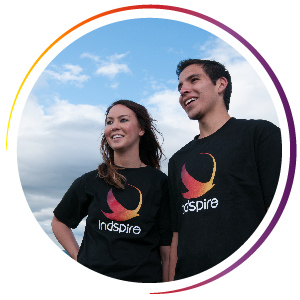Indspire Research Knowledge Nest
Fostering growth. Inciting change. Shaping the future.
The Indspire Research Knowledge Nest is the first Indigenous research program of its kind in Canada. With data analysis skills rapidly becoming critical to economic success, the Research Nest is poised to seize this exciting opportunity to foster Indigenous engagement and leadership in quantitative research and data science roles. The program will be guided by an Advisory Committee of researchers, leaders, and key stakeholders who will provide direction and input on the development of this important initiative.
Why is research important to Indigenous peoples in Canada?
There is currently no national repository that consistently tracks post-secondary and labour market data for First Nations, Inuit, and Métis students in Canada. This data gap limits policy makers, industry, organizations, and community’s capacity to make informed decisions in the area of education for Indigenous peoples. Indspire’s Research Knowledge Nest aims to fill this gap through Indigenous-led research to provide evidence for decision making and identify how education supports affect labour market outcomes, the socio-economic wellbeing of Indigenous peoples, and community prosperity.
Sponsorship Opportunities
If you’re interested in exploring partnership opportunities with us, please reach out to Kate Espina, Director, Major Gifts at kespina@indspire.ca. Click here to learn more about our initial partners.
Thank you to our supporters
Major Supporter

Project Supporter
Hodgson Family Foundation
Supporter
Diane Lookman Fund
Research Nest Initiatives
Research Nest Focus Areas
Indspire’s Research Knowledge Nest develops research on the following topics:
- Barriers for Indigenous peoples to post-secondary education and graduation
- Links between economic development, labour market participation and education
- Implementation of the Truth and Reconciliation Commission’s Calls to Action in post-secondary institutions and how this implementation affects Indigenous students
- The impact of Indspire’s programs, using data collection tools such as Indspire’s National Education Survey
- Best practices for compiling current data holdings and developing future data collection processes
New research topics will be developed based on Indigenous-led research directions from Indspire Research Knowledge Nest Advisory Committee, the Research Nest’s Research Assistants, and Indspire’s Board of Directors.
Reports
The work of Indspire’s Research Knowledge Nest will provide decision-makers with key insights into the educational attainment of First Nations, Inuit, and Métis peoples in Canada, fostering a new understanding of how education supports the overall wellbeing of Indigenous peoples.
Check out the reports by the Indspire Research Knowledge Nest below:
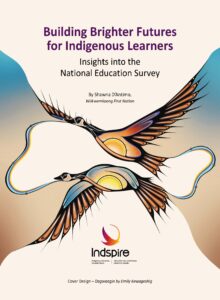
*NEW*
Building Brighter Futures for Indigenous Learners: Insights into the National Education Survey (2024)

*NEW*
Building Brighter Futures for Indigenous Learners: Insights into the National Education Survey (2024)
Indspire launched the National Education Survey to learn about Indigenous student experiences. This report highlights the impacts of receiving post-secondary financial support on students’ education and employment outcomes. Survey responses were collected from 6,930 past Building Brighter Futures: Bursaries and Scholarships (BBF) 2016–2022 program recipients. Through this report we learned that BBF funded students are exceling in their programs and also finding success in their careers of interest.
Read Report
View Infographic
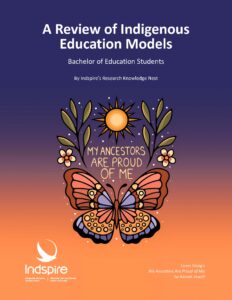
*NEW*
A Review of Indigenous Education Models: Bachelor of Education Students (2024)

*NEW*
A Review of Indigenous Education Models: Bachelor of Education Students (2024)
Indspire was interested in understanding the experiences of Bachelor of Education Students. This report includes the experiences of 58 Building Brighter Future recipients who shared insights into their journey in Bachelor of Education (B.Ed.) programs. Through this report we learned that Indigenous students had varied experiences with the inclusion of Indigenous Knowledge in their courses and expressed strong interest in land-based and community-based learning opportunities.
Read Report
View Infographic
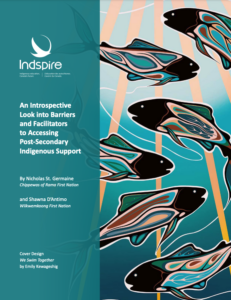
An Introspective Look into Barriers and Facilitators to Accessing Post-Secondary Indigenous Support (2023)

An Introspective Look into Barriers and Facilitators to Accessing Post-Secondary Indigenous Support (2023)
Indspire wanted to learn how the quality and accessibility of Indigenous supports in higher education could be improved. This led to insightful discussions with Indigenous post-secondary students and administrators. Key insights are shared in this report looking at the barriers and facilitators to accessing post-secondary Indigenous support. This is used to inform recommendations to better support Indigenous students succeed in their education. Providing more wholistic support, addressing funding limitations, and prioritizing Indigenous students’ needs are some practices that institutions can work to improve.
Read
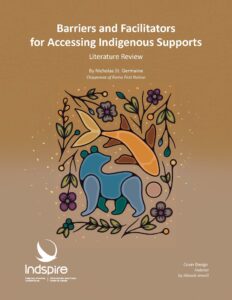
Barriers and Facilitators for Accessing Indigenous Supports – Literature Review (2022)

Barriers and Facilitators for Accessing Indigenous Supports – Literature Review (2022)
Having support is essential for Indigenous students making their way through post-secondary education (PSE). Indspire’s goal is to support students through every stage of their education to ensure that they have a successful career. To do this, Indspire provides funding to thousands of students per year, however, it is also essential that they feel supported by the education institutions they are attending. Through helping institutions to improve the supports they can provide to Indigenous students, Indspire can ensure that students find academic success. Therefore, it is important for the Rivers to Success (R2S) team to identify which services are available to students in PSE, and what barriers may impact how accessible and effective these supports are. Identifying areas for improvement will help the R2S team collaborate with Indigenous student support centres to improve the support they can provide their students. The insights gained from this study will also aide in developing program content to help provide support to Indigenous students in their journey through PSE.
Read
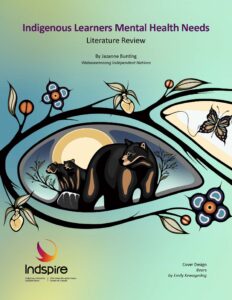
Indigenous Learners Mental Health Needs – Literature Review (2022)

Indigenous Learners Mental Health Needs – Literature Review (2022)
The purpose of this literature review is to understand the factors that impact the mental health of Indigenous learners and to identify the mental health needs of Indigenous learners in order to develop innovative program content to support the wellbeing of Indigenous learners.
In this literature review, the focus will be on Indigenous groups in Canada, including First Nations, Inuit, and Métis populations. However, due to the lack of research on each specific population, it is difficult to assess the variations of each group. As a result, this review will discuss the generalizations of Indigenous populations in Canada.
Read
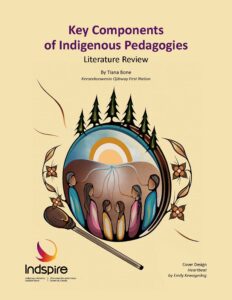
Key Components of Indigenous Pedagogies – Literature Review (2022)

Key Components of Indigenous Pedagogies – Literature Review (2022)
At Indspire, supporting the education of Indigenous people is at the forefront of the organization. Whether that is through providing bursaries and scholarships for post-secondary students or through programs such as Teach for Tomorrow: Indigenous Educator Apprenticeship Program. The program is a pathway for Indigenous high school students to become certified teachers or educational assistants through a supportive cohort experience (Indspire, 2022). This literature review serves to supplement an environmental scan of how Indigenous pedagogies (how knowledge is taught) are included and implemented within teacher education programs across Canada. To better support Indigenous students that are considering a career as Indigenous educators, Indspire is interested in reviewing and defining Indigenous pedagogical practices and approaches. Indspire intends to help Indigenous students decide where to attend post-secondary education by creating a checklist based on identifying which programs include Indigenous pedagogies and provide other forms of support for Indigenous students.
Read
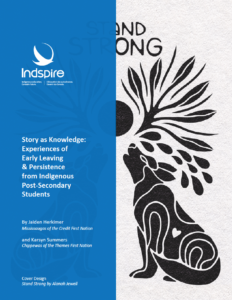
Story as Knowledge: Experiences of Early Leaving & Persistence from Indigenous Post-Secondary Students (2022)

Story as Knowledge: Experiences of Early Leaving & Persistence from Indigenous Post-Secondary Students (2022)
Early leaving is a phenomenon that is not discussed often, despite it being a common reality that post-secondary students face. The first-year early leaving rate in Canada is 6.6% for university students and 15.4% for college students (Childs et al., 2017). However, for Indigenous students, these rates increase by 5 to 7% and result in lower graduation rates than non-Indigenous students (Childs et al., 2017). As a follow-up to the report “Holding Our Ground: Indigenous Student Post-Secondary Persistence & Early Leaving” (Herkimer, 2021), this study aims to tell the stories of Indigenous post-secondary students who have experiences with early leaving and persistence.
Read
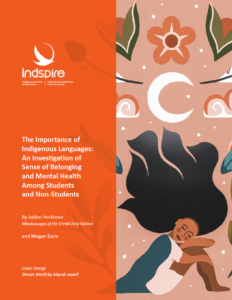
The Importance of Indigenous Languages: An Investigation of Sense of Belonging and Mental Health Among Students and Non-Students (2022)

The Importance of Indigenous Languages: An Investigation of Sense of Belonging and Mental Health Among Students and Non-Students (2022)
Having a sense of belonging can create better mental health outcomes for students, as feelings of belonging to one’s school buffers against stress (Gopalan & Brady, 2019; Gopalan et al., 2021). It should also be noted that some research suggests that when Indigenous students go to post-secondary school they are at risk of experiencing “placelessness.” This happens when there is no meaningful connection between the student and the academic community, resulting in a low sense of belonging (Joseph & Windchief, 2015). However, a report by Indspire (2021) uncovered that 63% of Indigenous students sampled felt they belonged at their post-secondary institution.
Moreover, from an Indigenous worldview, mental health is holistic and intertwined with history, identity, and language (Lavallee & Poole, 2010). Thus, if Indigenous people and students have a higher sense of belonging as a result of language knowing, they may also consequentially have better mental health outcomes. Improving mental health is important because the effects of colonialism and intergenerational trauma have historically and presently affected the mental health of Indigenous peoples negatively (Herkimer, 2021; Lavallee & Poole, 2010). Therefore, this report will investigate the connections between Indigenous language, sense of belonging to the broader Indigenous community in Canada, and mental health, as a way of breaking cycles of cultural decline and intergenerational trauma.
Read
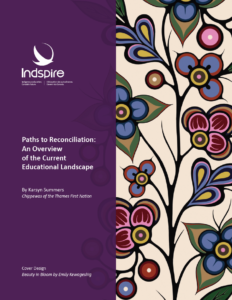
Paths to Reconciliation: An Overview of the Current Educational Landscape (2022)

Paths to Reconciliation: An Overview of the Current Educational Landscape (2022)
It has been over six years since the TRC released its final report and 94 Calls to Action. According to the Yellowhead Institute’s 2021 Report on Calls to Action, there is “little to no movement on the more substantive, structural changes called for by the TRC.” Many Indigenous students continue to experience significant educational and career gaps compared to their non-Indigenous counterparts (Treleaven, 2018). These gaps can be attributed to the lack of core changes made within the post-secondary landscape. On the other hand, there is a noticeable tendency to check off symbolic elements outlined in the Calls to Action, often thought to be quick remedies to larger systemic problems (Jewell & Mosby 2021).
At the heart of this project is the concept of accountability. A combination of increased visibility and accountability to both internal and external stakeholders should hopefully ensure that PSIs remain committed to the Reconciliation Plans they have constructed. This literature review explores common ideas and themes that emerge from Canadian PSIs’ response to the TRC Calls to Action. There is interest from a wide variety of partners and entities in how PSIs across Canada have integrated the TRC Calls to Action, particularly those Calls related to the educational experience of Indigenous peoples.
Read
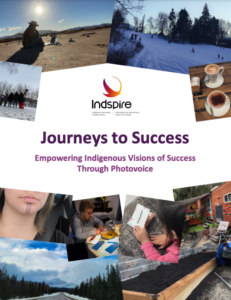
Journeys to Success: Empowering Indigenous Visions of Success Through Photovoice (2022)

Journeys to Success: Empowering Indigenous Visions of Success Through Photovoice (2022)
At Indspire, we believe that Indigenous communities have the right to define their own vision of success. This photovoice project intends to encourage, present, and highlight Indigenous perceptions of success through photographs and narratives. The goal is to raise awareness and dialogue to better support Indigenous communities’ image of success. The purpose is to represent and empower Indigenous visions and voices to strengthen the wider community’s understanding of Indigenous worldviews. To further support Indspire’s interest in supporting Indigenous students’ unique journey to success, the research question ‘What is success within an Indigenous lens?’ was developed for our project.
Read
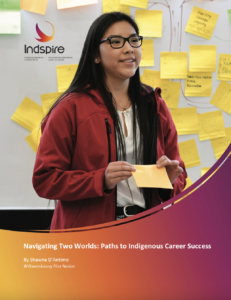
Navigating Two Worlds: Paths to Indigenous Career Success (2021)

Navigating Two Worlds: Paths to Indigenous Career Success (2021)
Each year, Indspire supports thousands of Indigenous students with reaching their educational goals. A strong relationship exists between educational attainment and career success. Therefore, understanding education as an integral part of career transition allows for the creation of appropriate supports. With these supports, more students can be well prepared to successfully transition into their careers of choice. Through inspiring Indigenous education and achievement, Indspire can positively influence these students’ socioeconomic outcomes.
Read
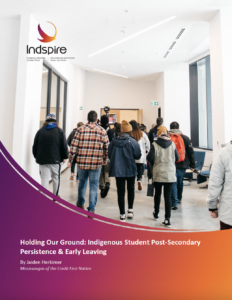
Holding Our Ground: Indigenous Student Post-Secondary Persistence & Early Leaving (2021)

Holding Our Ground: Indigenous Student Post-Secondary Persistence & Early Leaving (2021)
Despite high aspirations of attainment, Indigenous students are more likely to leave postsecondary education prematurely than their non-Indigenous peers in Canada and around the world. Higher education is becoming increasingly critical for obtaining employment and economic security, as employees often require some form of certification, credential, or license to be hired. Part of Indspire’s commitment to students is to help guide them through school and into their careers. Thus, the need to discover why this disparity exists is pressing.
Read
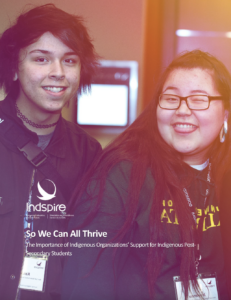
So We Can All Thrive: The Importance of Indigenous Organizations’ Support for Indigenous Post-Secondary Students (2021)

So We Can All Thrive: The Importance of Indigenous Organizations’ Support for Indigenous Post-Secondary Students (2021)
In previous Indspire surveys, Building Brighter Futures: Bursaries, Scholarships, and Awards program (BBF) recipients have frequently mentioned that receiving funding from Indspire—an Indigenous national charity aimed at specifically supporting Indigenous students—is different, more meaningful, than receiving funding from other organizations. We wanted to explore these feelings further, to understand what sets Indspire apart from non-Indigenous organizations from the perspective of Indigenous students.
Read
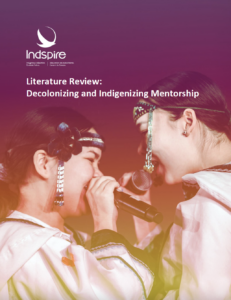
Literature Review: Decolonizing and Indigenizing Mentorship (2021)

Literature Review: Decolonizing and Indigenizing Mentorship (2021)
The purpose of this literature review is to synthesize information on the topic of decolonizing and Indigenizing mentorship to understand:
- Perceptions of mentorship within Indigenous communities;
- Indigenous ways of relationship building;
- Culturally-informed mentorship;
- Best practices for good quality mentoring relationships;
- Traditional structures of mentorship and why they are important.
Read
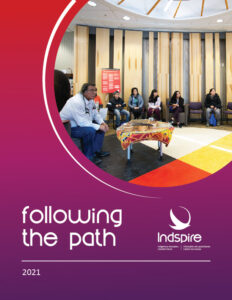
Following the Path (2021)

Following the Path (2021)
In 2015, the Truth and Reconciliation Commission of Canada (TRC) released 94 Calls to Action to “redress the legacy of residential schools and advance the process of Canadian reconciliation.” At the five-year anniversary of the release, Indspire wanted to gain insight into the progress of the education-related Calls to Action by learning about the experiences of Indigenous postsecondary students.
Read
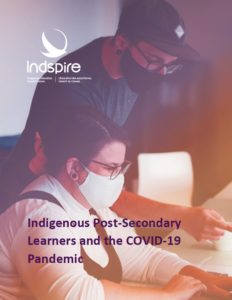
Indigenous Post-Secondary Learners and the COVID-19 Pandemic (2021)

Indigenous Post-Secondary Learners and the COVID-19 Pandemic (2021)
The COVID-19 pandemic hit post-secondary learners hard in the Spring of 2020. In the final weeks of their term, faculty members were suddenly required to pivot to online learning. Students who relied on on-campus supports and IT facilities were scrambling as services were shut down. In the Fall of 2020, Indspire continued to hear from Indigenous learners that the pandemic was affecting them in unique and acute ways. Facing extra costs, delays in administrative processes, and shifts in access to supports, Indigenous post-secondary learners were navigating a new system in an already complex experience of pursuing post-secondary education.
Read
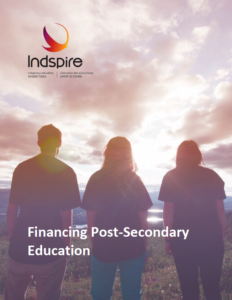
Financing Post-Secondary Education (2021)

Financing Post-Secondary Education (2021)
Financial challenges are a significant barrier for Indigenous peoples in Canada pursuing postsecondary education (PSE) (Ottmann, 2017). In order to better support Indigenous students in completing their educational goals, it is vital to understand the wide variety of financial situations Indigenous students experience. A key component of this is learning how Indigenous students are alleviating their educational costs. This report provides insight into how Indigenous students are financing PSE costs by comparing educational financing information obtained from Indigenous students to a sample from non-Indigenous students.
Read
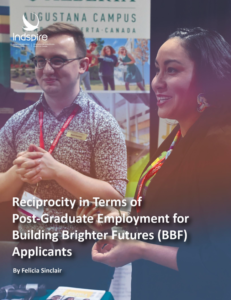
Reciprocity in Terms of Post-Graduate Employment for Building Brighter Futures Applicants (2020)

Reciprocity in Terms of Post-Graduate Employment for Building Brighter Futures Applicants (2020)
In early 2020, Indspire deployed the National Education Survey (NES) to over 14,000 past Building Brighter Futures (BBF) recipients, over 5,700 of whom responded. An analysis of the NES data was performed to assess the tendency for Indigenous graduates to gravitate toward employment within the not-for-profit sector, within an Indigenous community, or within both areas, called reciprocal motivation in this report. The areas of employment for those who were engaged in reciprocal work were also examined. Indigenous students’ employment in the non-profit sector demonstrates a motivation toward reciprocity in terms of the employment they sought following graduation.
Read
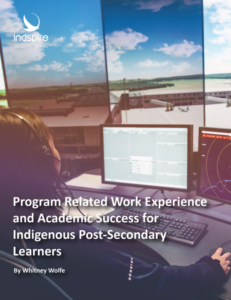
Program Related Work Experience and Academic Success for Indigenous Post-Secondary Learners (2020)

Program Related Work Experience and Academic Success for Indigenous Post-Secondary Learners (2020)
Work opportunities related to post-secondary students’ programs of study can have a positive impact on students’ success when they transition from post-secondary institutions across Canada into a career setting. Students seek out these co-op, internship, work, and research opportunities to help them define their career goals. The practical skills and experience that students gain from work experiences related to their field of study can generate many positive outcomes in terms of skill development, professionalism, and future employment (Jackel, 2011). Program related work experience (PRWE) has been shown to increase graduate employability in a number of ways.
Read
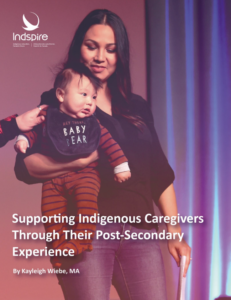
Supporting Indigenous Caregivers Through Their Post-Secondary Experience (2020)

Supporting Indigenous Caregivers Through Their Post-Secondary Experience (2020)
Indspire aims to see that “within a generation, every Indigenous student will graduate”, and since nearly one third of all Building Brighter Futures: Bursaries, Scholarships, and Awards (BBF) applicants and recipients are caregivers responsible for at least two dependents (children, Elders, partners, etc.), it is critical for Indspire to understand our students who have dependents and their needs to ensure that we are effectively supporting them to succeed in their chosen fields. Indspire has a role to play in ensuring that all Indigenous students can have equitable support in achieving their post-secondary goals.
Read
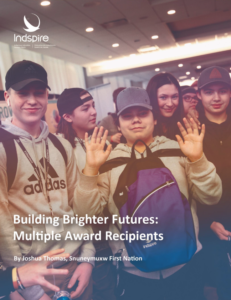
Building Brighter Futures: Multiple Award Recipients (2020)

Building Brighter Futures: Multiple Award Recipients (2020)
Indspire’s Building Brighter Futures: Bursaries, Scholarships, and Awards (BBF) program provides financial awards to First Nations, Inuit, and Métis post-secondary students across Canada. Students are permitted to apply for a BBF award once per academic year, regardless of the results of any previous applications. Therefore, many BBF recipients receive multiple awards from Indspire throughout their education. For example, in the 2019/2020 school year, 48% of successful BBF recipients were BBF recipients from a previous year as well.
Read
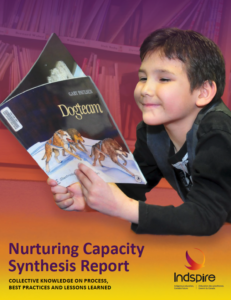
Nurturing Capacity Synthesis Report – Collective Knowledge on Process, Best Practices and Lessons Learned (2020)

Nurturing Capacity Synthesis Report – Collective Knowledge on Process, Best Practices and Lessons Learned (2020)
This report includes findings from 59 projects across Canada initiated and completed between 2014 and 2019. Indspire reviewed and synthesized these reports to determine what was held in common and to document these findings.
The Nurturing Capacity Program focused on education initiatives that supported the needs of First Nations, Inuit and Métis students across Canada. Many of the projects focused on more than one student population. Nurturing Capacity Program projects were implemented within elementary schools (kindergarten to Grade 4), middle schools (Grades 5–8) and high schools (Grades 9–12). As seen in our student populations, many of the projects focused on more than one education level.
Learn More
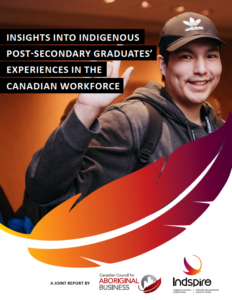
Insights into Indigenous Post-Secondary Graduates’ Experiences in the Canadian Workforce (2020)

Insights into Indigenous Post-Secondary Graduates’ Experiences in the Canadian Workforce (2020)
The Canadian Council for Aboriginal Business (CCAB) and Indspire are undertaking an exciting research collaboration and entering the next phase in their long-standing relationship. These two Indigenous organizations with national mandates have partnered to analyze their data and uncover key insights contributing to our collective understanding of educational and socio-economic outcomes of Indigenous peoples in Canada. CCAB and Indspire’s research collaboration provides an opportunity to gain insights that can not only shed light on important findings related to Indigenous students in the workplace today, but can also enable employers, business leaders, and post-secondary institutions to better understand how to meet the needs of new generations of Indigenous youth.
Read
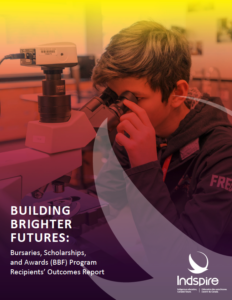
Building Brighter Futures: Bursaries, Scholarships and Awards Recipients’ Outcomes Report (2020)

Building Brighter Futures: Bursaries, Scholarships and Awards Recipients’ Outcomes Report (2020)
Indspire is in the unique position to celebrate Indigenous learners’ success and share their challenges with broader audiences, many of whom are able to create change. To support this aim, in 2020, Indspire launched the National Education Survey (NES). The NES was developed to better understand BBF recipients’ post-secondary and labour market outcomes and provided an opportunity for BBF recipients to share their story, speak to the impact of the BBF program, and identify key areas where they require additional support. The survey was administered to the more than 14,000 individuals who received funding from BBF in the past six years. Over 6,500 individuals responded.
Read
Questions?
Are you interested in a Research Assistant position? Or are you an established First Nations, Inuit, or Métis research professional who’d like to be a mentor? Maybe you’re a decision-maker or potential partner who’d like to know more about how the Research Nest’s work could benefit you?
We’d love to hear from you. Reach out to us at research@indspire.ca or give us a call at 1-855-463-7747.
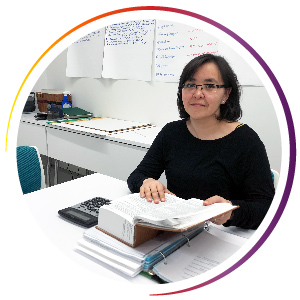

![]()
